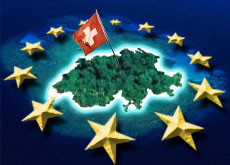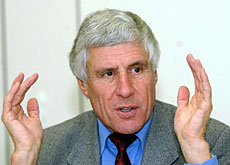Swiss pay the price for “island life”

Switzerland is an expensive country. But is it too expensive – or do the high prices just reflect the high standard of living?
In an interview with swissinfo, price administrator Rudolf Strahm says Switzerland’s political isolation has turned it into a “high price island”, and calls for far-reaching reforms to bring the cost of living into line with neighbouring countries.
He says that, in addition to a lack of competition in several key domestic sectors, the Swiss economy is increasingly suffering the consequences of over-priced imports.
His comments come against the background of a growing public debate about the overall cost of living in Switzerland, sparked in part by the forthcoming arrival on the Swiss market of German retail discounters Aldi and Lidl.
swissinfo: Does it really matter if Swiss prices are higher, given that wages and the overall standard of living are also higher?
Rudolf Strahm: Generally, we do have both high wages and high prices. But we also have a specific element, which is higher import prices. That is [partly] because foreign companies charge higher prices for deliveries to Switzerland, based on our higher purchasing power.
This is classic marketing strategy – the segmentation of markets. The problem is that we have no – or very few – possibilities for parallel imports. In other words, we tend to have a single importer who has a monopoly on distribution.
swissinfo: What effect does this have?
R.S.: Imported products cost on average 20 to 25 per cent more than they do in Germany. On the other hand, our exporters have to accept European or international prices. This gap represents an important obstacle to economic growth.
swissinfo: Who are the worst offenders?
R.S.: In some sectors, such as oil products, we have strong competition and world market prices. On the other hand, we have sectors with heavy protectionism, for instance pharma, agricultural and food. We also have industrial products, such as cars, bicycles and spare parts, which are between ten and 25 per cent more expensive.
swissinfo: How strong is the resistance to change?
R.S.: The resistance is not transparent. It is not equally strong in all sectors, but some [sectors] have considerable political influence all the way up to government, including the so-called “capture” of parts of the state administration by certain industries.
swissinfo: If direct imports were to be allowed, would prices really drop or would the benefits go largely to the importers?
R.S.: I think this is [an excuse] made by opponents of parallel imports. If the distributor can import the products directly he should be able to sell them at European prices, provided there is a competitive market structure.
swissinfo: How much difference do you think Aldi and Lidl will make in the retail sector?
R.S.: It is difficult to forecast, but they will probably have major difficulties penetrating the Swiss market. They may gain a few per cent in market share, but they will not eliminate existing structures. For instance, our high agricultural import tariffs apply to everyone. The real competition is likely to be in the field of personnel – not so much wages as the total number of people employed.
swissinfo: But could lower prices also mean lower wages, both in the retail trade and elsewhere?
R.S.: It may be that there is some pressure on wages. However, this already exists without import liberalisation. The export sector already faces this pressure, but is still able to pay relatively high wages because it has high productivity and high quality.
swissinfo: You are due to retire in four years’ time. What do you hope to have achieved by then?
R.S.: To end Switzerland’s position as a “high price island”. Our non-participation in the European Economic Area [following a nationwide vote in 1992] has had a high price, particularly in regard to imports.
Some changes are already under way. The Swiss introduction of the Cassis de Dijon principle [under which products authorised in one EU country may be sold in any other] has now been agreed and the process will take about two years. However, totally new market structures cannot be introduced [so quickly].
swissinfo–interview: Chris Lewis
Switzerland has two federal authorities controlling market activitities: the competition commission and the price administrator.
The latter monitors prices in areas where competition is limited.
His brief covers three main areas: health (i.e. drugs, doctors, hospitals); infrastructure (i.e. electricity, telecoms); other (i.e. fixed service fees).
Strahm says domestic wages and costs are only part of the reason for Switzerland’s higher prices.
He argues that imported goods are equally expensive – but Swiss producers and consumers do not benefit.
The price watchdog believes the Swiss decision 13 years ago not to join the European Economic Area is at the root of the current situation.

In compliance with the JTI standards
More: SWI swissinfo.ch certified by the Journalism Trust Initiative


You can find an overview of ongoing debates with our journalists here. Please join us!
If you want to start a conversation about a topic raised in this article or want to report factual errors, email us at english@swissinfo.ch.